Monthly Archives: January 2025

 In the United States, at least on American soil, World War II seemed so far away, but the reality is that in parts of the United States, including Wyoming, the war, or part of it was closer to home than we realized. In fact, it was as close as an hour away from where my mom’s family lived, in Casper, Wyoming. Of course, I don’t mean the fighting, but the area was still connected to World War II. In Douglas, Wyoming, there was an internment camp for Prisoners of War (POW) called Camp Douglas. The camp was used between January 1943 and February 1946 housing first Italian and then German prisoners of war in the United States. During 1942, the first year of United States involvement in World War II, an estimated 2000 prisoners came to the United States. The POW camps overseas were so overcrowded that by September they needed a place to take them, where they could safely be contained. In order to be prepared for the 50,000 POWs being held by the British in North Africa, the US needed to reactivate the Civilian Conservation Corps camps. They opened unused portions of several major military bases; utilizing such facilities as fairgrounds, racetracks, armories, and auditoriums; and setting up “tent cities” in remote areas of the country.
In the United States, at least on American soil, World War II seemed so far away, but the reality is that in parts of the United States, including Wyoming, the war, or part of it was closer to home than we realized. In fact, it was as close as an hour away from where my mom’s family lived, in Casper, Wyoming. Of course, I don’t mean the fighting, but the area was still connected to World War II. In Douglas, Wyoming, there was an internment camp for Prisoners of War (POW) called Camp Douglas. The camp was used between January 1943 and February 1946 housing first Italian and then German prisoners of war in the United States. During 1942, the first year of United States involvement in World War II, an estimated 2000 prisoners came to the United States. The POW camps overseas were so overcrowded that by September they needed a place to take them, where they could safely be contained. In order to be prepared for the 50,000 POWs being held by the British in North Africa, the US needed to reactivate the Civilian Conservation Corps camps. They opened unused portions of several major military bases; utilizing such facilities as fairgrounds, racetracks, armories, and auditoriums; and setting up “tent cities” in remote areas of the country.
In the fall of 1942, knowing that they would need a better plan, they began the longer-range $50 million-dollar program of POW camp construction. The government had decided that for security reasons, the camps needed be located in remote and isolated areas. They didn’t want any camps to be built within 170 miles of the east and west coasts; nor within a 150-mile-wide zone along the Canadian and Mexican borders. They also forbade locations near shipyards, munitions plants, and other vital wartime industries due to fears of sabotage. These regulations made the ideal site, according to the Army Corps of Engineers, an area of 350 acres of level and well-drained land located within five miles of a railroad and 500 feet from any public road. Wyoming and other rural states became the prime locations, hence Camp Douglas. Another reason for placing the POW camps in the United States, was that it also abided by the international Geneva Convention agreements, which were signed by 47 world powers in 1929, and defined treatment of enemy prisoners. The USA made a much greater attempt to live up to the pact than the Axis powers. According to interpretation by American military leaders, camps had to be constructed to the minimum standards of a regular military compound. That insured that the prisoners had adequate housing, food, and water to sustain life and in the end, they were treated so humanely, and after the war many of them would have loved to just stay here. Wyoming was not opposed to a POW camp within its borders, because the presence of a large POW camp would provide an economic boon to a state and the nearby communities so “Chambers of Commerce, businessmen, the Commerce and department, city mayors, and the state’s political leaders sought to secure the establishment of military installations” in Wyoming, according to historian TA Larson. These lobbying efforts resulted in the construction of a new air base at Casper, a large expansion at Cheyenne’s Fort FE Warren, and the selection of a site on the outskirts of the small town of Douglas as the location for a POW camp.
The Douglas site met the defense regulations and was quickly approved. It was located in Converse County within one mile of a rail line that passed through downtown Douglas. The 687-acre site sat above the banks of the North Platte River. The federal government acquired the land through condemnation, which brought about a legal battle in which the defendants were eventually awarded more money for their land than the government had initially proposed. The government was rather between a rock and a hard place. They wanted the contracts for the site. In December of 1942, government surveyors and engineers arrived in Douglas, fueling rumors of the proposed POW camp although the official announcement did not come until January of 1943. The low bid came from Peter Kiewit and Sons of Omaha, Nebraska, and the company set up operations in Douglas by February of 1943. Four to five hundred construction workers used the 4-H buildings on the state fairgrounds as dorms and a dining hall. The government contract specified the buildings be completed within 120 days. Kiewit and Sons actually finished the job in 95 days. “The officers’ quarters, clubhouse, and softball field were located at the north main entrance to the camp, outside the double rows of wired fencing (the inner fence was electrified) and guard towers that surrounded the rest of the complex. The hospital area and the troop barracks were built directly inside the fence. Beyond that, the prison complex was organized into three compounds, separated by wire electrified fencing, each with a capacity of approximately one thousand men. Auxiliary areas for prisoners included a large outdoor recreation area near the river, a softball field, and one football field. The camp also accommodated a variety of operational functions in buildings designed for the motor pool, a heating plant, warehouses, corrals, a K-9 dog unit, a sewage disposal plant, as well as a salvage yard and gravel pit.”
The influx of people prompted the Douglas mayor to urge local residents to rent any spare rooms in their houses to the incoming military personnel and their families as a housing crunch was inevitable in the town. The town leaders with the home front war effort quickly established a Service Men’s Center in the downstairs room of the Moose Lodge. Moose members cleaned and remodeled the room while the ladies of the lodge scrounged up furniture and curtains from local donations. It was a concerted effort to welcome the new facility and its personnel. The Moose Lodge basement became a popular hangout for servicemen with daily hours from 5pm until midnight and stayed open till 2am on Saturday nights. The Center was affiliated with the national USO organization during the final days of the war. The local newspaper focused on the anticipation and excitement of the arrival of the US Army coming to their town, especially the officers, which helped to downplay any apprehension people may have felt about having an enemy population one mile away that outnumbered the townsfolk. Because so many of Wyoming’s men, like many other states, were serving in the war, it was decided that the prisoners could fill in some of the gaps outside the camp. Wyoming was left with a critical shortage of agricultural labor. POWs provided the solution to the problem and performed many essential jobs related to agriculture. They harvested crops, whether it was cotton in the South or sugar beets and timber in Wyoming. Local ranchers and farmers formed a corporation, in anticipation of the much-needed prison labor. A manager was appointed to handle the governmental red tape involved in the contracting procedures.

 The story of this POW camp is an important part of the history of the town of Douglas. While Camp Douglas is no longer in use, there are still a few remaining structures. The walls of the Officer’s Club were painted with murals by three of the Italian prisoners. They are beautiful murals that depict western life and folklore. They are now registered with the United States Department of the Interior National Park Service on the National Register of Historic Places.
The story of this POW camp is an important part of the history of the town of Douglas. While Camp Douglas is no longer in use, there are still a few remaining structures. The walls of the Officer’s Club were painted with murals by three of the Italian prisoners. They are beautiful murals that depict western life and folklore. They are now registered with the United States Department of the Interior National Park Service on the National Register of Historic Places.

 On January 26, 2025, my newest great grandson, Cristian Corey David Petersen decided to forego the nudge to arrive that was scheduled for January 27th and arrive on his own a day early. Tired of waiting, Cristian began his push toward his birth-day a couple of weeks ago, but it was slow going. For a time, we thought he was still going to have to be nudged, like his older brothers were, but he was determined, and he got his way. Cristian made his entrance at 3:36pm on that Sunday afternoon, and he has been happily enjoying his time with his family since then. While early, Cristian was not premature…weighing in at 7 pounds 4 ounces and he is 20 inches long. Cristian has a
On January 26, 2025, my newest great grandson, Cristian Corey David Petersen decided to forego the nudge to arrive that was scheduled for January 27th and arrive on his own a day early. Tired of waiting, Cristian began his push toward his birth-day a couple of weeks ago, but it was slow going. For a time, we thought he was still going to have to be nudged, like his older brothers were, but he was determined, and he got his way. Cristian made his entrance at 3:36pm on that Sunday afternoon, and he has been happily enjoying his time with his family since then. While early, Cristian was not premature…weighing in at 7 pounds 4 ounces and he is 20 inches long. Cristian has a 
 medium amount of dark hair, and olive skin like his brothers. He is just a sweet little boy.
medium amount of dark hair, and olive skin like his brothers. He is just a sweet little boy.
Cristian joins a family, now of five, including his mommy and daddy, Athena and Josh Petersen. He also joins brothers, Justin and Axel, who can’t wait for him to get older so he can play with them. They are rough and rowdy boys, so I hope Cristian has a tough exterior. Nevertheless, both Justin and Axel are also very loving, and Cristian will be very much loved…amid wrestling matches, which are so common for boys. Cristian will adapt and will learn to “roll with the punches” so to speak, and I think the three brothers will quickly become best friends. Being the baby brother, he will have a reprieve for a little while, and then the brothers will expect him to get as tough as they are…and I’m sure he will.


Cristian is a good baby and of course, sleeps a lot at this point. I’m not sure Axel really notices him much, being just 16 months old. Justin at 27 months, does notice him, and he can say his name now. He wasn’t too sure of him at first, and he cried a bit. But once daddy got him calmed down, he could see that he was going to be a fun brother, and now he likes him. It is so cute when he says his name. Cristian has a lot to look forward to in his young life. Soon he will be running around with his brothers and yelling at the top of his lungs as they play and have a great time. We are so excited and blessed to have this new little sweetheart in our family. Welcome to the world Cristian!! We love you so much already!!

 The average person speaks one, or maybe two languages, but there are those among us who have an ability to master multiple languages. Whenever we hear of someone who can speak multiple languages, most of us are rather surprised actually. It’s hard to wrap our minds around the idea that someone can speak and comprehend more than a couple of languages. Nevertheless, there are a number of people who can do just that. For me, one extra language, while not overly difficult, was enough. I suppose a lot depends on how motivated you are too, as was proven through other monarchs of the era.
The average person speaks one, or maybe two languages, but there are those among us who have an ability to master multiple languages. Whenever we hear of someone who can speak multiple languages, most of us are rather surprised actually. It’s hard to wrap our minds around the idea that someone can speak and comprehend more than a couple of languages. Nevertheless, there are a number of people who can do just that. For me, one extra language, while not overly difficult, was enough. I suppose a lot depends on how motivated you are too, as was proven through other monarchs of the era.
One of the first people on record, at least that I have ever heard of was Cleopatra. She was the Queen of ancient Egypt from 51 BC to 30 BC. I think what really surprises me on that is the fact that in those days, many women were not even educated at all. Still, I suppose that her stature allowed Cleopatra to receive an education that many other women of that era could not. Cleopatra was the first member of her dynasty to speak Ancient Egyptian. That wasn’t enough for her though. She was also able to speak eight other languages including Ancient Greek, Ancient Iranian, Ancient Parthian, Syriac, Ethiopian, Troglodytae, Hebrew, and Arabic. That is so shocking to me. My mind would probably jumble the different languages mid-sentence. I’m not a dummy, but I guess my mind just isn’t geared toward multiple languages.
So, why would Cleopatra choose to learn so many languages? Apparently, she wanted to restore the territories that once belonged to the Ptolemaic Kingdom across North Africa and West Asia. In addition, she wanted to be  able to converse directly with the people in her kingdom. I guess that would be that mark of a good monarch. Cleopatra could easily switch between languages, and she rarely needed an interpreter even when speaking with her subjects who usually spoke their own language. She spoke to her subjects unassisted and replied to them in their own language. This was very unusual, because the kings of Egypt before Cleopatra had never made the effort to learn any of the native languages. Whether or not she was a good monarch or even actually spoke that many languages, I can’t say, nor can anyone else, considering the years she was a monarch, but I think it says something that she tried to communicate with the people she served over.
able to converse directly with the people in her kingdom. I guess that would be that mark of a good monarch. Cleopatra could easily switch between languages, and she rarely needed an interpreter even when speaking with her subjects who usually spoke their own language. She spoke to her subjects unassisted and replied to them in their own language. This was very unusual, because the kings of Egypt before Cleopatra had never made the effort to learn any of the native languages. Whether or not she was a good monarch or even actually spoke that many languages, I can’t say, nor can anyone else, considering the years she was a monarch, but I think it says something that she tried to communicate with the people she served over.

 It’s National Amy Day!!! Did you even know there was such a thing? I didn’t, but for our family, Amy Day is usually celebrated on June 1st, because that is our Amy’s birthday. Nevertheless, today is actually National Amy Day, so we will celebrate again!! To put it quite simply, National Amy Day is a day set aside to celebrate girls named Amy. It is not the only name that has a set aside day to celebrate it, but I thought it was interesting anyway.
It’s National Amy Day!!! Did you even know there was such a thing? I didn’t, but for our family, Amy Day is usually celebrated on June 1st, because that is our Amy’s birthday. Nevertheless, today is actually National Amy Day, so we will celebrate again!! To put it quite simply, National Amy Day is a day set aside to celebrate girls named Amy. It is not the only name that has a set aside day to celebrate it, but I thought it was interesting anyway.
National Amy Day is celebrated every year on January 28th. In modern French, Amy is an English variant of the Old French name Aimée. Amée was a translation of ‘Amata,’ a Latin name originating from ‘Amatus,’ which means ‘beloved.’ That meaning was one of 
 the things I liked about the name Amy. Amie and Ami are two other spelling possibilities. Although it is much less popular for babies these days, Amy was the second most popular baby name in the 1970s, right after Jennifer. That makes sense then, because my Amy was born in 1976. It is still a short, charming “Little Women’s” style classic today.
the things I liked about the name Amy. Amie and Ami are two other spelling possibilities. Although it is much less popular for babies these days, Amy was the second most popular baby name in the 1970s, right after Jennifer. That makes sense then, because my Amy was born in 1976. It is still a short, charming “Little Women’s” style classic today.
I first came across the name, not from the movie “Little Women,” but from a western show I used to watch years ago, called “The Monroes.” The show only lasted a year, from 1966 to 1967. It was a story of the survival of a group of five kids heading West, whose parents died in an accident. The kids were determined to go on, to fulfill their parents’ dream. The youngest sibling was played by Tammy Locke, and her name was Amy. She was 
 such a cute little girl. I had never known anyone named Amy, but I liked this little girl, even though her name wasn’t really Amy either. I guess that is probably how many different names become popular. Whatever the case may be, we have always felt blessed to have our Amy, as well as her older sister, Corrie, who also has a day…I have discovered.
such a cute little girl. I had never known anyone named Amy, but I liked this little girl, even though her name wasn’t really Amy either. I guess that is probably how many different names become popular. Whatever the case may be, we have always felt blessed to have our Amy, as well as her older sister, Corrie, who also has a day…I have discovered.
Little did I know that there is also a National Corey Day, that falls on December 10th…but that’s a story for another day. Today is National Amy Day, so happy National Amy Day to all the Amy’s out there. Have a great day!!

 The past few years, my niece, Lacey Killinger has been living her dream life. On October 28, 2023. They decided to wait on their honeymoon until April, and it was totally worth the wait. They went to Cancun, Mexico, and had so much fun that they want to go back sometime in the future. One of the highlights of the trip was when they went swimming in caves down there. The cave walls were beautiful, and it was a very different experience for them. The trip was one they won’t forget. Lacey and Chris have very demanding jobs, and when the time came for the trip, they were both very ready. With her marriage to Chris, Lacey became a bonus mom to his children, Brooklyn (11) and Jaxon (9). She is really enjoying that new part of her life. The kids really love her, and she really loves them.
The past few years, my niece, Lacey Killinger has been living her dream life. On October 28, 2023. They decided to wait on their honeymoon until April, and it was totally worth the wait. They went to Cancun, Mexico, and had so much fun that they want to go back sometime in the future. One of the highlights of the trip was when they went swimming in caves down there. The cave walls were beautiful, and it was a very different experience for them. The trip was one they won’t forget. Lacey and Chris have very demanding jobs, and when the time came for the trip, they were both very ready. With her marriage to Chris, Lacey became a bonus mom to his children, Brooklyn (11) and Jaxon (9). She is really enjoying that new part of her life. The kids really love her, and she really loves them.
Lacey owns and operates LuxLou Beauty, where she specializes in hair and makeup for weddings, although she does both for other occasions too. Her business is doing fantastic she loves her salon and all her clients. Her 
 business is doing so well, in fact, that the family “had” to take a trip to the Black Hills of South Dakota over Labor Day so Lacey could do a girl’s hair and makeup for her wedding. Now, that’s a hardship, hahaha!! While Lacey and Chris have both been to the Black Hills before, the kids had not. They had so much fun. They went to Deadwood and Rapid City, to the WaTiki water park, to Mount Rushmore, and Bear Country. They got a special show at Bear Country, when some brown bears were wrestling and then walked right next to the car. That was a highlight of their time at Bear Country for sure. Very few people get to be so close to a bear…safely and without fear of attack.
business is doing so well, in fact, that the family “had” to take a trip to the Black Hills of South Dakota over Labor Day so Lacey could do a girl’s hair and makeup for her wedding. Now, that’s a hardship, hahaha!! While Lacey and Chris have both been to the Black Hills before, the kids had not. They had so much fun. They went to Deadwood and Rapid City, to the WaTiki water park, to Mount Rushmore, and Bear Country. They got a special show at Bear Country, when some brown bears were wrestling and then walked right next to the car. That was a highlight of their time at Bear Country for sure. Very few people get to be so close to a bear…safely and without fear of attack.
The holidays were awesome for the Killinger family. Spending time at Christmas with family and extended family was great. Then for New Year’s, they had the kids, so they made a party of it. The did a crab boil and watched the ball drop in Times Square. The food was amazing…or so I’m told, and I can see that Lacey and Chris are great cooks. I love being awake and at a party for New Years Eve. There is just something about making note of the changing of the years that appeals to me, and to many other people too. For Brooklyn and Jaxon, getting to stay up so late was a rare treat too.


Lacey and Chris have put the kids in sports this year, and Lacey has been fundamental in teaching them the skills of the sports they are in. She especially enjoys teaching Brooklyn the sport of volleyball, because Brooklyn loves volleyball as much as Lacey does. Lacey has also been great for helping the kids to achieve the fashion and hair looks they want. It really pays to have a professional hair stylist to make your hair look just the way you dreamed it would look, so you fit in nicely with the rest of the kids at school. And it’s not a negative to have that be free either. Let’s face it, hair stylists, especially the great ones, like Lacey, don’t come cheap. Today is Lacey’s birthday. Happy birthday Lacey!! Have a great day!! We love you!!
 Our aunt, Margee Kountz became an aunt at a very young age…just 18 months, to be exact. Of course, I’m sure she really didn’t know about it for a while, and by the time she did know, it was simply the normal for her. Margee is not the youngest aunt in history, of course, because some kids are actually born as aunts or uncles. Still, it is an interesting fact of life for Margee. She grew up around not one, but a number of nieces and nephews. By the time Margee was eighteen years old, in 1967, she had four nieces and one nephew. Another niece and two nephews would be added in quick succession but also added to her life at about the same time, would be her own children, Dan and Sandi Kountz.
Our aunt, Margee Kountz became an aunt at a very young age…just 18 months, to be exact. Of course, I’m sure she really didn’t know about it for a while, and by the time she did know, it was simply the normal for her. Margee is not the youngest aunt in history, of course, because some kids are actually born as aunts or uncles. Still, it is an interesting fact of life for Margee. She grew up around not one, but a number of nieces and nephews. By the time Margee was eighteen years old, in 1967, she had four nieces and one nephew. Another niece and two nephews would be added in quick succession but also added to her life at about the same time, would be her own children, Dan and Sandi Kountz.
Becoming a mother was probably not all that much different from helping out with her 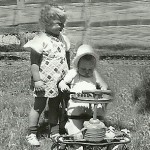 nieces and nephews, except for the fact that she had to take care of her own kids full time…not going home after babysitting, like she did with nieces and nephews. Maybe that’s why Margee was such a good mom both while she was married, and later as a single mom. Margee has always had a helping heart, and a heart for kids. In reality, she is just a kindhearted person in every way. She helped raise her grandchildren and helped care for her sister, my mother-in-law, Joann Schulenberg when we needed her help during mom’s Alzheimer’s disease. I don’t know what we would have done without Margee, and it was comforting to my mother-in-law, because she knew Margee, and we didn’t have to use a home health nurse or respite care worker as much.
nieces and nephews, except for the fact that she had to take care of her own kids full time…not going home after babysitting, like she did with nieces and nephews. Maybe that’s why Margee was such a good mom both while she was married, and later as a single mom. Margee has always had a helping heart, and a heart for kids. In reality, she is just a kindhearted person in every way. She helped raise her grandchildren and helped care for her sister, my mother-in-law, Joann Schulenberg when we needed her help during mom’s Alzheimer’s disease. I don’t know what we would have done without Margee, and it was comforting to my mother-in-law, because she knew Margee, and we didn’t have to use a home health nurse or respite care worker as much.

Those years of caring for others are behind Margee now, but she still has her health for the most part. She is the last of the siblings in her family, because her sisters, Joann and Linda are both in Heaven now. We are thankful to still have Margee with us. She is the last link to her entire generation. These days, Margee does all the common things people younger than she is, do online. She is on Facebook, she texts, and she uses a cell phone. At 76 years of age, many people have no idea how to operate in the computer age, but Margee is sharp as a tack, and she is still going strong on the tech stuff. That’s something to be proud of. Today is Margee’s 76th birthday. Happy birthday Margee!! Have a great day!! We love you!!

 Having started out his life in South Dakota, and having family there, my husband’s uncle, Bobby Cole was very much at home in the rural areas of that state. That is likely why he and Aunt Linda Cole moved to Kennebec, South Dakota after they got married. They liked the small-town feel and the peace and quiet. I can understand that. The times we went for visits, were very laid-back and relaxing, although I don’t think I could live there. There isn’t much to do, and if you aren’t visiting someone with whom you can play cards or something, it could get pretty boring. We liked it, because we were just visiting, but to live there…probably not.
Having started out his life in South Dakota, and having family there, my husband’s uncle, Bobby Cole was very much at home in the rural areas of that state. That is likely why he and Aunt Linda Cole moved to Kennebec, South Dakota after they got married. They liked the small-town feel and the peace and quiet. I can understand that. The times we went for visits, were very laid-back and relaxing, although I don’t think I could live there. There isn’t much to do, and if you aren’t visiting someone with whom you can play cards or something, it could get pretty boring. We liked it, because we were just visiting, but to live there…probably not.
Bobby, Linda, and their kids, Sheila and Pat lived there until the hotel they owned caught fire after being struck by lightning. They could have rebuilt it, I guess, but the population of the area and the hotel’s distance from the interstate made rebuilding impractical. So, they moved from their beloved Kennebec to Winnemucca, Nevada. Of course, that is a much bigger place, but the reality is that home is where you are. You may not like where you are, but it is still where home is. Nevertheless, they grew to like Winnemucca. They got jobs in the casinos, and they found that they liked that. They gambled a little, and won a little, which is nice.
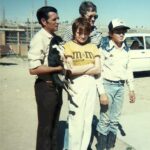

Bobby and Linda were always fun people to be around, and we enjoyed the visits we made to their home both in Kennebec and Winnemucca. I’m so glad that we took the time to really get to know Bobby, Linda, and their kids. We always felt like we had been a blessing to them, as they were to us. Bobby left us eleven years ago on May 30, 2014, following a courageous battle with cancer. He passed away in Colorado Springs, Colorado while seeking treatment. Today would have been Bobby’s 82nd birthday. Happy birthday in Heaven, Bobby. We love and miss you very much.

 Normally, we think of tornadoes or cyclones as a summertime event, but there is a different kind of a cyclone, known as a bomb cyclone, that can happen in the winter too. The Burns’ Day Storm, which began as Cyclone Daria, was an extremely violent windstorm that took place on January 25-26, 1990, over north-western Europe. Daria was one of the strongest European windstorms on record. It caused many fatalities in the UK and Europe. Because Europe has no official list of storm names, this storm was given several names. Cyclone Daria started on the birthday of Scottish poet Robert Burns, so it was dubbed The Burn’s Day Storm. It caused widespread damage and hurricane-force winds over a wide area. The storm was responsible for 47 deaths according to the Met Office (the United Kingdom’s national weather and climate service), although figures have ranged from 89 to over 100 deaths across Europe.
Normally, we think of tornadoes or cyclones as a summertime event, but there is a different kind of a cyclone, known as a bomb cyclone, that can happen in the winter too. The Burns’ Day Storm, which began as Cyclone Daria, was an extremely violent windstorm that took place on January 25-26, 1990, over north-western Europe. Daria was one of the strongest European windstorms on record. It caused many fatalities in the UK and Europe. Because Europe has no official list of storm names, this storm was given several names. Cyclone Daria started on the birthday of Scottish poet Robert Burns, so it was dubbed The Burn’s Day Storm. It caused widespread damage and hurricane-force winds over a wide area. The storm was responsible for 47 deaths according to the Met Office (the United Kingdom’s national weather and climate service), although figures have ranged from 89 to over 100 deaths across Europe.
The storm began as a cold front over the Northern Atlantic Ocean on January 23rd. By the 24th, it had a minimum central pressure of 992 mbar and began to undergo explosive cyclogenesis, sometimes referred to as a weather bomb. That is what makes it so dangerous. Cyclone Daria made landfall on the morning of the 25th over Ireland. It then tracked over to Ayrshire in Scotland. The lowest pressure of 949 mbar was estimated near Edinburgh around 4:00pm. After pounding the United Kingdom, the storm tracked rapidly east towards Denmark. Thus, causing major damage and 30 deaths in the Netherlands and Belgium.
Cyclone Daria’s strongest sustained winds recorded were between 70 and 75 mph, which is basically a weak Category 1 hurricane or Hurricane-force 12 on the Beaufort Scale. Strong gusts of up to 104 miles per hour were also reported. It was these strong gusts caused the most extensive damage. During the Great Storm of 1987, many anemometers stopped recording due to power outages, breakages due to excess wind speeds and measurement maxima being exceeded, but by the 1990 Cyclone Daria, the meteorological community had newer devices that remained independent of external power and could measure higher wind speeds. It is believed that wind speeds measured during the Burns’ Day Storm provided an accurate picture.
The Burns’ Day Storm of 1990 has been given as an example of when the Met Office “got the prediction right”. We often joke about the weather service, and just how famously inaccurate they can be, but we do appreciate them when they get it right, if we heed their warnings anyway. In this case, the model forecast hinged on observations from two ships in the Atlantic near the developing storm the day before it reached the UK.
During the day of the storm the Royal Netherlands Meteorological Institute (KNMI) increased warnings to force 11 and then to hurricane force 12. Research has shown that most of the general public simply couldn’t comprehend just how bad this storm was. Cyclones, after all don’t usually happen in winter. While unusual, the aftermath of this storm led to more awareness about the understanding of storminess among the public by the KNMI (Koninklijk Nederlands Meteorologisch Instituut), who started a teletext page and the introduction of special warnings for extreme weather events in reaction to these findings.
The casualties in Cyclone Daria were much higher than those of the Great Storm of 1987, partly because the storm hit during the daytime. More people were out and about. The storm caused extensive damage, with approximately 3 million trees downed, power disrupted to over 500,000 homes and severe flooding in England and West Germany. The storm cost insurers in the UK £3.37 billion, which was the UK’s most expensive 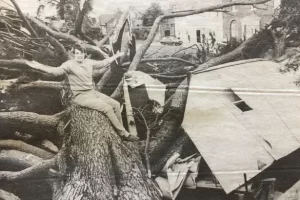
 weather event to insurers. Most of the deaths were caused by collapsing buildings or falling debris. There were a few miracles too, however. In one case in Sussex, a class of children was evacuated just minutes before their school building collapsed. Actor Gorden Kaye was also injured during the storm, when a plank of an advertising board was blown through his car’s windshield.
weather event to insurers. Most of the deaths were caused by collapsing buildings or falling debris. There were a few miracles too, however. In one case in Sussex, a class of children was evacuated just minutes before their school building collapsed. Actor Gorden Kaye was also injured during the storm, when a plank of an advertising board was blown through his car’s windshield.
 Apparently, earthquake documentation began about 4,000 years ago. That is a fact about which I had no idea. I’m sure the early documentation was somewhat primitive, because they would simply have to be recorded in journal of sorts. Many don’t realize that the process of measuring began nearly 2000 years ago, with the invention of the first actual seismoscope in 132 AD by a Chinese inventor called Zhang (‘Chang’) Heng. The device was remarkably accurate in detecting earthquakes from afar, and did not rely on shaking or movement in the location where the device was situated. Of some of the earliest recorded earthquakes, the deadliest occurred in China on January 23, 1556. While this quake was not the largest ever recorded, it was a powerful quake that rocked the province of Shaanxi and the neighboring province of Shanxi. The reason it was such a deadly quake was not the size, but rather the death toll, which was an estimated 830,000 people.
Apparently, earthquake documentation began about 4,000 years ago. That is a fact about which I had no idea. I’m sure the early documentation was somewhat primitive, because they would simply have to be recorded in journal of sorts. Many don’t realize that the process of measuring began nearly 2000 years ago, with the invention of the first actual seismoscope in 132 AD by a Chinese inventor called Zhang (‘Chang’) Heng. The device was remarkably accurate in detecting earthquakes from afar, and did not rely on shaking or movement in the location where the device was situated. Of some of the earliest recorded earthquakes, the deadliest occurred in China on January 23, 1556. While this quake was not the largest ever recorded, it was a powerful quake that rocked the province of Shaanxi and the neighboring province of Shanxi. The reason it was such a deadly quake was not the size, but rather the death toll, which was an estimated 830,000 people.
The 1556 Shaanxi quake was historically referred to as the Jiajing Great Earthquake because it occurred during Emperor Jiajing’s reign in the Ming dynasty. While death tolls might not be as accurate as they are today, the approximate death toll comes from local annals that also tracked 26 earthquakes in the region. Those records described the earthquake as being “starkly different” from others, saying that it leveled mountains, caused floods and fires that burned for days, and a drastically altered landscape. The annals estimated that some counties lost about 60% of their population.
Due to the inability to have accurate fatality recordings, the death toll is in question, but no one questions the 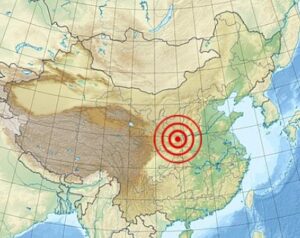 fact that the Shaanxi earthquake is considered the deadliest earthquake, because it is certain that the casualties are much higher than any other disaster. Following the Shaanxi quake, the second deadliest recorded earthquake was the 2004 earthquake and tsunami in the Indian Ocean that killed an estimated 230,000 people across Indonesia, Thailand, Sri Lanka and India. It is amazing to me that the next deadliest quake took so long to occur, considering the fact that making earthquake resistant structures didn’t begin immediately. Still, it is a blessing that many earthquakes don’t bring those huge death tolls.
fact that the Shaanxi earthquake is considered the deadliest earthquake, because it is certain that the casualties are much higher than any other disaster. Following the Shaanxi quake, the second deadliest recorded earthquake was the 2004 earthquake and tsunami in the Indian Ocean that killed an estimated 230,000 people across Indonesia, Thailand, Sri Lanka and India. It is amazing to me that the next deadliest quake took so long to occur, considering the fact that making earthquake resistant structures didn’t begin immediately. Still, it is a blessing that many earthquakes don’t bring those huge death tolls.
In the 1930s, the Richter scale was developed, and the magnitude of quakes became much clearer. Scientists theorized that the Shaanxi earthquake was likely between 8.0 to 8.3 in magnitude…definitely not the strongest ever recorded, but no less destructive. The most powerful earthquake recorded on the Richter scale was the 9.5-magnitude Valdivia Earthquake that struck Chile in 1960, according to the US Geological Survey (USGS). The seismic event created a tsunami which together killed an estimated 5,700 people…a far lesser number than the Shaanxi quake…amazingly. The 2004 Indian Ocean tsunami registered a 9.3 magnitude. So, the size of the quake cannot totally correlate to the death toll. The death toll is based more on the population in the area and the quality of the structures.
As to the Shaanxi quake, while it wasn’t the strongest recorded earthquake, its high death toll likely resulted from the destruction of the area’s densely populated communities and poorly constructed stone buildings. The people of the Shaanxi and Shanxi provinces responded to the disastrous quake by rebuilding in ways that would 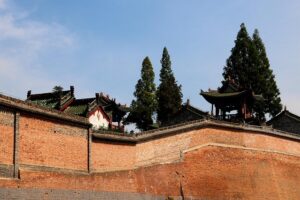 lessen the impact of future earthquakes, according to local records. Rather than us stone to rebuild, they used softer materials like bamboo and wood, which were more resistant to tremors and would cause less damage if knocked down again. They knew that they couldn’t prevent earthquakes, but they could make their impact less severe.
lessen the impact of future earthquakes, according to local records. Rather than us stone to rebuild, they used softer materials like bamboo and wood, which were more resistant to tremors and would cause less damage if knocked down again. They knew that they couldn’t prevent earthquakes, but they could make their impact less severe.
“At the very beginning of the earthquake, people indoors should not go out immediately. Just crouch down and wait for chances. Even if the nest is collapsed, some eggs in it may still be kept intact,” said earthquake survivor and scholar, Qin Keda, who wrote about his experience and came up with safety tips for people to follow in the event of another disaster.
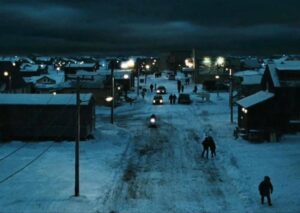 The next time you are upset about short winter days, think about Utqiagvik (formerly Barrow), Alaska…why do they keep changing the names of everything. The residents of America’s northernmost town had their final sunset last year on November 18, 2024, at 1:27pm. They will not see the Sun again until January 22, 2025, at 1:15pm. For those wondering, that is 65 straight days, or 1,560 hours, of darkness! If you happen to suffer from SAD (Seasonal Affective Disorder), you know that the shorter winter days can feel depressing. So just imagine having no sun at all for 65 days!!
The next time you are upset about short winter days, think about Utqiagvik (formerly Barrow), Alaska…why do they keep changing the names of everything. The residents of America’s northernmost town had their final sunset last year on November 18, 2024, at 1:27pm. They will not see the Sun again until January 22, 2025, at 1:15pm. For those wondering, that is 65 straight days, or 1,560 hours, of darkness! If you happen to suffer from SAD (Seasonal Affective Disorder), you know that the shorter winter days can feel depressing. So just imagine having no sun at all for 65 days!!
For most of us, it would be hard to imagine, going through that once, but every year? Yes, in Utqiagvik this is a yearly event. The reason is that everyone who lives above the Arctic Circle, will experience a day when the Sun sets for the rest of the winter. It is a fact of life, and those people who live there year-round, either like it and the novelty of it, or they accept it as a fact of life. Of course, on the flip side, the opposite event is also true, and the sun will return, and eventually will not set for days on end.
Due to its location, just 1,300 miles south of the polar North Pole, Utqiagvik experiences this long polar night.  Another contributing factor is the fact that the Earth orbits the Sun at a 23.5° tilt. During winter, areas near the poles tilt away from the Sun, leaving them with little or no sunlight. For the North Pole, this period lasts from September to March, so during that time, their daily amount of sunlight is limited, and at some points, severely limited, or nonexistent.
Another contributing factor is the fact that the Earth orbits the Sun at a 23.5° tilt. During winter, areas near the poles tilt away from the Sun, leaving them with little or no sunlight. For the North Pole, this period lasts from September to March, so during that time, their daily amount of sunlight is limited, and at some points, severely limited, or nonexistent.
While Utqiagvik residents did not see the Sun during this polar night period, they did still have some light during the day. This is due to the strange phenomenon known as “civil twilight” or the bending of the Sun’s rays around the Earth, so that they appear just above the horizon. The “civil twilight” creates beautiful blue, orange, and pink hues as the Sun’s rays scatter through Earth’s atmosphere. Initially, this twilight will last for about six hours each day. But by mid-December, it will shorten to just three hours as the North Pole tilts further away from the Sun.
Because of its location, Utqiagvik is the first Alaskan town to experience a polar night each year. Nevertheless, it is not the only one. In the late weeks of November, residents of Kaktovik, Point Hope, and Anaktuvuk Pass will also say goodbye to the Sun for a few months. Northern regions of Finland, Norway, Sweden, and parts of  Scotland also experience this phenomenon, though for shorter periods of time.
Scotland also experience this phenomenon, though for shorter periods of time.
While the lack of sunshine would seem punishing for most of us, there is a consolation prize for these hearty residents of the most remote parts of the planet. While the “polar night” is an annual phenomenon, so is the “midnight sun.” The “midnight sun” is their reward for their endurance of the “polar night.” During the summer months, they get to enjoy the “midnight sun” from May 12, 2025, to July 31, 2025, during which time the Sun remains visible both day and night. For Utqiagvik, this will mean no sunset for 82 consecutive days!! The good news…their days of sunshine are actually more than the days of darkness.

